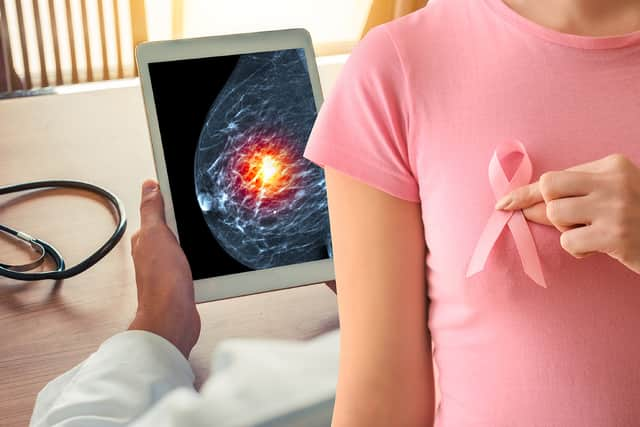Breast cancer: survival rates are rising - but charities warn government the disease 'is not a done deal'
and live on Freeview channel 276
Breast cancer charities have welcomed data showing that the survival rate for Britons who develop the disease has been going up, but say more government funding is essential to stop a tragic backslide.
On Sunday (25 June), Duchess of York Sarah Ferguson's royal representative revealed she had been diagnosed with breast cancer, and the 63-year-old was recovering from surgery performed at the King Edward VIII's Hospital in London.
Advertisement
Hide AdAdvertisement
Hide AdAccording to the NHS, about one in seven women will be diagnosed with breast cancer during their lifetime, but there is a good chance of recovery if the disease is caught early. In rare cases, men can develop breast cancer too.
Experts from two of the UK's pre-eminent breast cancer charities say the improved survival rate can be attributed to a range of things.
But they told NationalWorld any gains sit at a tenuous tipping point, with action on NHS funding, staffing issues, and preventing the disease in the first place necessary to preserve them.


Breast cancer survival rates show improvement
Breast cancer survival rates have improved over the last two decades, NHS Digital data shows. In England, the net survival rate for women diagnosed with breast cancer one year after diagnosis was 97.3% compared to 94.7% in 2005. In 2016, the five-year survival rate was 90%, compared with 84.2% in 2005. And as of 2011, the 10-year survival rate stood at 83.3%, up from 78.5% in 2005.
Advertisement
Hide AdAdvertisement
Hide AdNet survival is the survival of cancer patients compared with the expected survival of the general population.
The survival rate for breast cancer is significantly higher than for cancer overall. For all cancer types, the one-year survival rate was 74.6% as of 2020 (people diagnosed in 2020 and followed up in 2021).
Cancer charities say government planning and support 'critical'
Breast Cancer Now chief executive Baroness Delyth Morgan told NationalWorld the "hugely welcomed" research revealing most early-stage breast cancer patients will be long-term survivors, "is testament to significant progress made on breast cancer research over the decades, including advances in diagnosis and treatment".
“But we must be clear, breast cancer is not a done deal," she said. Each year in the UK, 11,500 people die from the disease.
Advertisement
Hide AdAdvertisement
Hide Ad"Despite the tireless work of NHS staff, we know many women are waiting far too long for a diagnosis and are experiencing anxious delays to their treatment," she added. "Without urgent action from governments across the UK to get breast cancer services back on track, we risk seeing these decades of progress unravelling."
Baroness Morgan said there was still a lot to do to ensure the increasing numbers of people living with - and beyond - breast cancer got the treatment and support they needed to live well.
"The UK governments must urgently publish a fully-funded long-term workforce plan for the NHS, crucially setting out the numbers of staff needed," she said.
"Only then can we guarantee people with breast cancer the best chances of survival, both now and in future.”
Advertisement
Hide AdAdvertisement
Hide AdBreast Cancer UK's head of science Dr Hannah Moody told NationalWorld while they welcomed the "staggering improvements in survival over the past 20 years", they also noted that the incidence rates of breast cancer were still increasing.
The charity's focus was on putting prevention first, she said, and they had seen an upward trend in enquiries and engagement with their prevention advice and practical support.
"Any improvements in breast cancer survival are good news," Dr Moody said. She attributed much of the higher survival rate is to "the hard work of cancer researchers and clinicians", who have developed novel, tailored medicines that can better treat many types of breast cancer.
"As well as the many breast cancer patients who have volunteered to be part of a clinical trial," she said. "Additionally, better public awareness of signs and symptoms of breast cancer and early detection is key to improving outcomes and may have contributed to the overall survival rates."
Advertisement
Hide AdAdvertisement
Hide AdDr Moody said it was "critical" that the UK took meaningful action to decrease the rising incidence rates of breast cancer through strong scientific research, but also, importantly, "strong policy at the government level".
"At least 30% of breast cancer cases could be prevented through effective prevention interventions in the UK. That means around 17,000 fewer people would receive a devastating diagnosis, preventing immeasurable suffering and reducing the burden on our already stretched NHS."
Comment Guidelines
National World encourages reader discussion on our stories. User feedback, insights and back-and-forth exchanges add a rich layer of context to reporting. Please review our Community Guidelines before commenting.